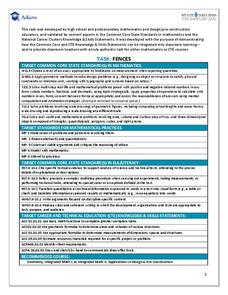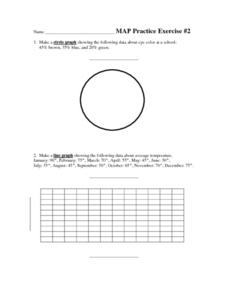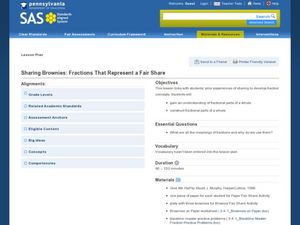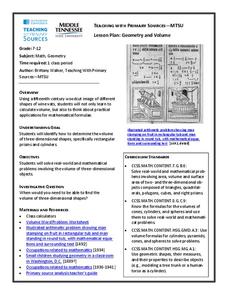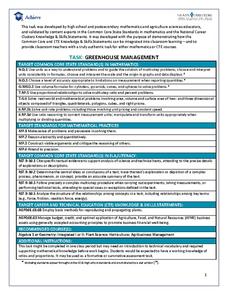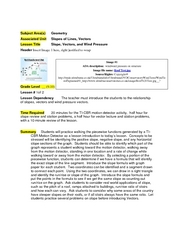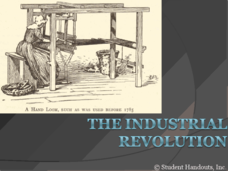Illustrative Mathematics
Shape Hunt Part 2
Shapes are everywhere in the world around us, from rectangular doors to the circular wheels of a car. The second lesson in this series opens the eyes of young mathematicians to this wonderful world of shapes as they search the classroom,...
Teach Engineering
Catching the Perfect SAR Waves!
Zero in on an interesting resource involving radar technology. Groups construct a radar sensing unit and learn to calibrate the system. Using the radar system and the Pythagorean Theorem, they calculate distances between objects.
Houghton Mifflin Harcourt
Unit 6 Math Vocabulary Cards (Grade 4)
In need of math vocabulary cards? Use a set of 66 vocabulary cards with topics focused mostly on geometry terms. Each sheet has two cards on it. The top half has the word printed in bold text, while the bottom half has the card with...
Achieve
Fences
Pupils design a fence for a backyard pool. Scholars develop a fence design based on given constraints, determine the amount of material they need, and calculate the cost of the project.
Curated OER
Pixel Drawings
Middle and high schoolers re-create a magazine photo or other picture and make it into a drawing using pixels. This fun art project should be a hit with your charges! The materials needed to implement the lesson should be easy to get,...
Curated OER
MAP Practice
In this geometry worksheet, students create circle, line and bar graphs using different comparisons of events. There are 24 questions with an answer key.
Curated OER
Sharing Brownies: Fractions That Represent a Fair Share
Elementary graders discover the concept of fractional pieces of a whole. They investigate the meanings of fractions in everyday life and why they are used. Pupils divide brownies amongst each other to demonstrate the use of fractions...
Chapman University
A Pythagorean-Style Proof of the Sine Sum-of-Angles Formula
This well organized poster shows a step-by-step algebraic proof and related graphic. Understanding how formulas were derived, connects learners to the idea that the study of mathematics is continuous and cumulative. Learners will...
Exploratorium
Beyond Dominoes: Polyominoes
Dominoes, polyominoes, tetrominoes, and pentominoes are the subject of this interesting math activity designed for middle schoolers. Pupils cut out shapes that are embedded in a worksheet in the plan, and experiment with them by...
Virginia Department of Education
Geometry and Volume
The history of math is fascinating! Utilize a woodcut primary source image from 1492 and posters from the 1930s to help geometers apply their volume-calculation skills to real-life questions.
EngageNY
Complex Numbers and Transformations
Your learners combine their knowledge of real and imaginary numbers and matrices in an activity containing thirty lessons, two assessments (mid-module and end module), and their corresponding rubrics. Centered on complex numbers and...
Achieve
Greenhouse Management
Who knew running a greenhouse required so much math? Amaze future mathematicians and farmers with the amount of unit conversions, ratio and proportional reasoning, and geometric applications involved by having them complete the...
Curated OER
Orbital path of Landsat
Young scholars comprehend how Landsat satellites orbit teh Earth to produce images. They comprehend the elliptical path of satellites. Students recognize that a different orbital path is needed for different satellites to perform their...
NTTI
Vectors: Traveling, But in What Direction
High schoolers watch a video of real-world situations regarding speed, direction, velocity, force, etc. and answer questions while viewing. They then practice drawing and using vectors to solve more real-world problems.
Curated OER
Slope, Vectors, and Wind Pressure
A hands-on instructional activity using the TI-CBR Motion Detector to provide information to graph and analyze. The class uses this information to calculate the slope of motion graphs and differentiate scalar and vector quantities. There...
Curated OER
Wind Effects on Model Building: Pre-Lab for Truss Design and Testing
Emerging engineers perform pre-lab calculations in this first of a three-part lesson plan on model building. They determine the forces of tension and compression in a truss. After completion of the worksheet, pupils will draw a draft of...
Curated OER
The Industrial Revolution
Contrasting between the "Haves" and the "Have-Nots" of 18th-19th century Europe, this presentation explores the social and technological implications of the Industrial Revolution. Inventions, social trends, and scientific breakthroughs...
Curated OER
Pronoun Reference
Do your young readers have a hard time with using the correct pronouns? Use this resource to help them practice identifying and fixing incorrect pronouns. The worksheet includes twenty sentences, some of which need to be fixed, and some...
EngageNY
Modeling Riverbeds with Polynomials (part 2)
Examine the power of technology while modeling with polynomial functions. Using the website wolfram alpha, learners develop a polynomial function to model the shape of a riverbed. Ultimately, they determine the flow rate through the river.
Beauty and Joy of Computing
Building Your Own Blocks
Isn't building with blocks an activity for toddlers? The third lab of a five-part unit teaches young computer scientists how to create their own block instructions for programming. They use these blocks to create geometric figures, spell...
Teach Engineering
Let's Take a Spin: One-Axis Rotation
Investigate the effect of one-axis rotations on geometric figures. Scholars learn to use snap cubes and the right-hand rule to draw figures after rotations about the x-, y-, or z-axes. They try their hands at examples created by the...
Teach Engineering
New Perspectives: Two-Axis Rotation
Two-axis rotations ... twice the fun as one-axis rotations! The last installment of a five-part module teaches scholars how to conduct two-axis rotations. They create isometric drawings before and after the rotations.
DiscoverE
Spaceship to Mars
Feel like a rocket scientist for the day. Using only paper and tape, scholars create a framework for a spaceship to Mars. Each sheet of paper costs $10 million and each piece of tape costs $100,000. Make sure you stay within budget!
Curated OER
Three Tangent Circles
In this tangent circles instructional activity, high schoolers use pi to solve a problem involving tangent circles. This one-page instructional activity contains 1 problem. The answer is provided at the bottom of the page.





